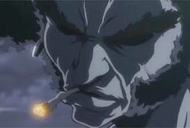
Afro Samurai
Samuel L. Jackson is the definition of cool. Or is he? With Pulp Fiction over a decade gone, he still has plenty of mojo working for him, but not all of his decisions have been great. Snakes on a Plane, the internet phenomenon and box-office mediocrity, made it look like Jackson might have jumped the proverbial shark. Black Snake Moan, due out soon, looks for all the world like an exploitation film out of the '70s. It could be cool, but who knows? Lending his voice or his credibility to a show doesn't automatically spell success or quality. Nevertheless, it's his larger than life persona that fuels the advertising for Afro Samurai, an American/Japanese co-production backed by Spike TV. The question is, does this festival of gory revenge need his tie-in?
In a apocalyptic retro-future world that combines ancient Japanese styles with cell phones and cyber technology, a gruesome war is on. Numbered headbands denote the hierarchy of the land's greatest combatants, and only the man who bears the #2 headband can challenge the #1 to a deadly duel. Legend has it that becoming the #1 can lead to unimaginable power. The warrior with the #2 headband, then, is in constant danger from those who aspire to greatness by killing him off and swiping the band so they can challenge the world's toughest living warrior.
Afro is only a young boy when his sword-wielding father, the #1, is beheaded in a duel with a lisping gunslinger. Afro, goaded by the gunman to confront him once he's ready to duel a god, leaves the scene with only a sword and his father's noggin. The story unfolds as the much older Afro, now the #2, seeks to return to the mountain where his father's killer waits for the inevitable confrontation. Accompanied only by a shadowy motormouth who comments on every situation, Afro finds himself up against a bevy of killers that range from simple clods to a robotic carbon copy of himself. Afro's biggest threats, however, will come from his past, and his youth is explored in flashbacks as his former friends become his darkest enemies.
One thing is certain: Spike TV got its money's worth. Afro Samurai is animated to be a spectacle, and that it is. Although its artistic style is a little dated -- intentionally, I believe -- you couldn't ask it to look any better. Every slashed neck and severed limb (didn't I mention this was gory?) is rendered with care. As far as the English voice acting, it's uniformly impressive. Jackson only has a few lines as Afro, seeing that he's the strong and very silent type, but he switches up his voice nicely to play Afro's wacked-out conscience of a friend. It's not a stretch, and Jackson is here to sell DVDs, but he does fine. While the show is not aimed at a high-minded audience, the dialogue flows far better than most anime adaptations (probably because this was intended for an English audience in the first place). Most genre fans will want to see the work on display here, even if they don't care for the other elements.
The program itself is about as simple as you can get -- it's a revenge story even less complex than Kill Bill (though perhaps even gorier). Is this a criticism? Not exactly. The characters themselves are the story, and the backstory of Afro becomes a compelling tragedy. For a man who says little, Afro makes a striking protagonist...much like Kenshiro and Vampire Hunter D before him. It's clear to me that the creators of Afro Samurai weren't looking to modern anime for inspiration; instead, there's clear homage to '80s source material like Ninja Scroll and Fist of the North Star. Those films were hardly plot-oriented; they were all about gory action splayed large on the screen. Afro Samurai is a show for 20-and-30-somethings who grew up watching Streamline tapes over and over again, not sophisticated fans of anime who grew up having every show on Japanese television just a mouse click away. I admit that I found Afro Samurai had some of the best raw action I've seen in an anime for a long time, and I thought it was enjoyable...with a few caveats.
There are two problems with Afro Samurai. First is the sheer amount of extreme violence on display. Watching the five episodes within a day or so, as I did, becomes exhausting as the carnage continues on and on. In fact, the action almost becomes dull by the end. There's so much destruction on display that by the time the final confrontation came, I was ready just to get to the end already. Related to this is the second issue: its brutal hopelessness. There are a never-ending stream of cruel competitors for Afro to fight with leering grins and stark-mad eyes, and that's just the start of it. Afro's past is tragic, and the decisions he makes lead to stark, sad outcomes. And though it might be spoiling something to say it, the ending is not really an ending at all. There is no end to the cycle of viciousness. While I thought the show was well-made and entertaining to watch, I felt perhaps a tiny bit less of a person by the ending. It displays all too realistically the truth that revenge might seem sweet in the short term but leads to a never-ending circle of death. In fact, the resolution to the show really dampened my enthusiasm for the whole.
My recommendation of Afro Samurai is based on the skill and care put into the presentation. Much of it is incredibly impressive. If you love samurai action and slash-and-hack features, then you will adore this show. If you're a Samuel L. Jackson fan, you might get a kick out of his work as the lead character. But if you're easily disturbed or disquieted, it's one to avoid. It's a dark story with an unhappy ending where the ends, bleak and harsh and cruel as they are, justify the means.
Afro Samurai -- extreme and gratuitous graphic violence, language, brief sexuality -- B

